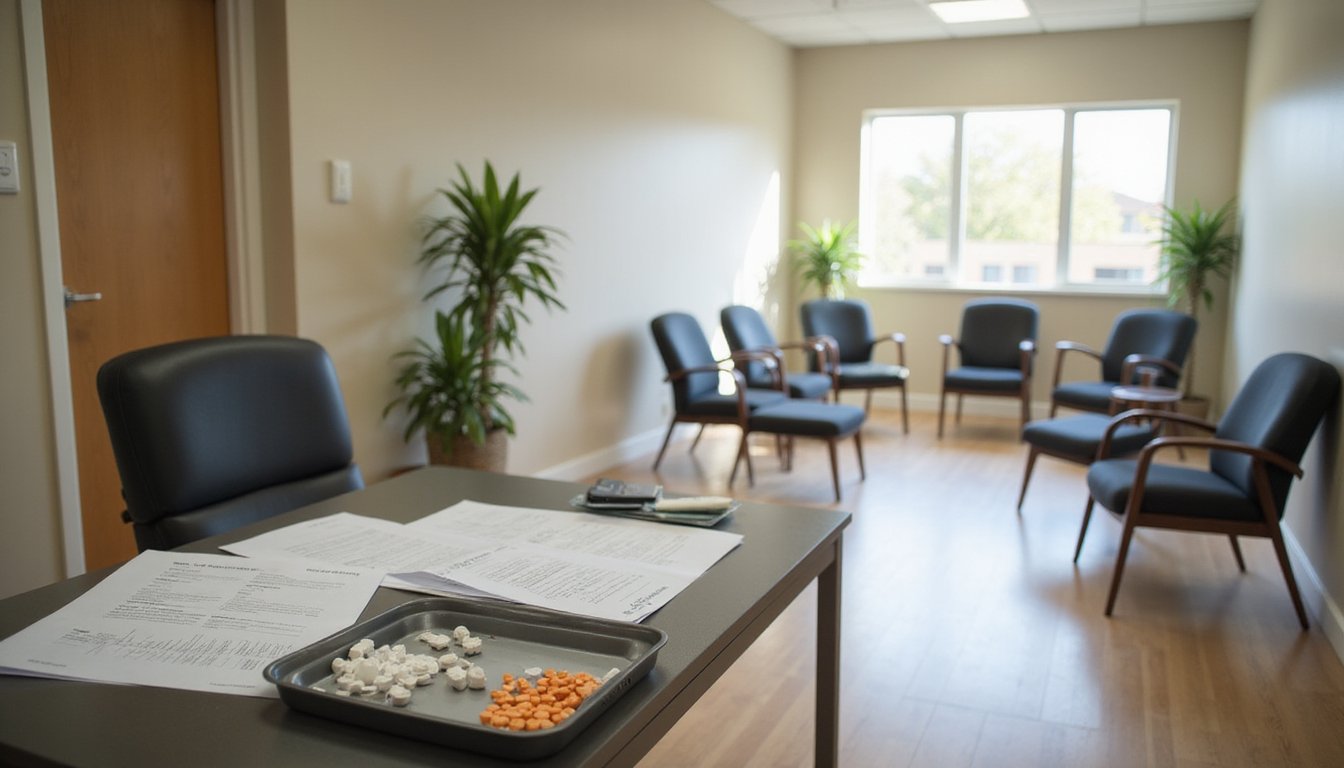In sober living homes, you’ll develop crucial recovery skills through structured daily routines and accountability measures. You’ll master time management, financial literacy, and healthy coping mechanisms while living in a supportive, substance-free environment. Through regular check-ins, group activities, and therapy sessions, you’ll build stress management techniques and identify personal triggers. These foundational skills create a strong bridge between rehab and independent living, with each component playing a pivotal role in your long-term recovery expedition.
Building a Strong Foundation Through Daily Structure

While moving from rehab to independent living presents significant challenges, a structured daily routine in sober living homes provides the necessary foundation for lasting recovery. You’ll find yourself establishing household rhythms through fixed wake-up times, structured meals, and mandatory recovery meetings that create a predictable environment for your healing journey. Living in a supportive, substance-free environment helps minimize triggers and temptations during this critical transition period. Cloudflare security helps protect the online resources and support systems you’ll need to access during your recovery journey. If you experience issues accessing recovery websites, you can contact administrators for assistance.
Your day will include encouraging active participation in morning check-ins and evening reflections, helping you set clear goals and monitor your progress. Time blocks dedicated to chores, therapy sessions, and recreational activities guarantee you maintain a balanced, purposeful schedule. By following house rules regarding curfew and substance abstinence, you’ll develop the discipline needed for long-term sobriety. This consistent structure serves as a bridge between intensive treatment and independent living, reinforcing the stability crucial for sustained recovery.
Mastering Essential Life Skills for Independence
As you move into independent living, mastering essential life skills becomes a vital aspect of your recovery path. You’ll learn to balance responsibilities while developing time saving techniques that support your sobriety. From financial management to healthy communication, these skills create a foundation for long-term success, including cultivating hobbies and interests that enrich your daily life. Learning to cook nutritious meals helps establish healthy eating habits and self-sufficiency. Mindfulness meditation can help you stay grounded and reduce anxiety during recovery’s emotional challenges. Living in recovery requires continuous growth and an ongoing commitment to personal development.
Developing life skills supports recovery by creating structure, building independence, and fostering personal growth through positive daily routines and healthy habits.
- Master time management through digital calendars and planners, breaking down goals into achievable steps
- Build financial literacy by creating budgets, establishing savings, and practicing responsible spending habits
- Develop strong interpersonal skills through active listening and setting healthy boundaries
- Maintain wellness through nutrition education, exercise routines, and consistent sleep schedules
These practical skills strengthen your independence while reinforcing your commitment to recovery, helping you navigate life’s challenges with confidence and resilience.
Developing Healthy Coping Mechanisms

Understanding your personal triggers and stress responses is essential for maintaining long-term sobriety in a sober living environment. Since research indicates that 40-60% relapse after treatment, developing strong coping skills is crucial. You’ll learn to implement mindfulness techniques and emotional awareness practices that help you recognize and regulate challenging feelings before they escalate into potential relapse situations. Through structured guidance and daily practice, you can develop a personalized toolkit of healthy coping mechanisms that includes stress management strategies, breathing exercises, and grounding techniques customized to your specific recovery needs. Research shows that those in recovery benefit significantly from seeking social support as a vital coping strategy while learning to manage challenges in sober living homes. Engaging in activities like yoga and hiking can provide natural ways to release feel-good endorphins while promoting overall well-being in recovery.
Building Stress Management Skills
Because stress management plays a vital role in maintaining sobriety, sober living homes prioritize developing healthy coping mechanisms through structured environments and evidence-based techniques. You’ll learn to manage daily pressures while developing emotional self-awareness and cultivating introspective habits through proven methods. Practicing mindful breathing exercises can activate the body’s natural relaxation response and reduce anxiety levels.
- You’ll participate in structured routines and mandatory house activities that create stability, reducing uncertainty and anxiety while building self-discipline. A focus on safe housing allows residents to fully concentrate on their recovery journey without the added stress of unstable living conditions. Regular accountability meetings reinforce commitment to maintaining a drug-free lifestyle.
- You’ll engage in mindfulness practices like meditation and yoga, which can increase long-term sobriety rates by up to 60%.
- You’ll benefit from peer support and group activities that normalize recovery challenges and foster emotional bonds.
- You’ll integrate healthy lifestyle habits, including regular exercise, proper nutrition, and consistent sleep patterns, enhancing your stress resilience and emotional regulation.
Identifying Personal Relapse Triggers
While maintaining sobriety requires vigilance, identifying your personal relapse triggers serves as a critical foundation for long-term recovery success. Through personal cue identification, you’ll learn to recognize specific situations, emotions, and behaviors that could threaten your sobriety.
An environmental risk assessment helps you understand how your surroundings impact recovery. You’ll need to evaluate social circles, living conditions, and daily routines that might expose you to substance-related pressures. With relapse prevention therapy available, individuals can better navigate the transition from rehab to independent living. Stress from major life changes and financial pressures can significantly increase relapse risk. Pay attention to warning signs like withdrawal from support systems, changes in behavior patterns, or increased stress levels. Working with a caregiver for monitoring can provide additional accountability and support in identifying potential relapse triggers.
Remember that triggers often surface within the initial six months post-treatment. By recognizing your unique risk factors, whether they’re emotional distress, social pressure, or environmental cues you can develop targeted strategies to maintain your recovery expedition effectively.
Mindfulness and Emotional Regulation
Mindfulness practices form a cornerstone of emotional regulation in sober living environments, equipping you with essential tools to navigate recovery challenges. Through regular mindfulness-based interventions, you’ll develop stronger self-regulation skills while experiencing positive neurological adaptations that bolster your recovery journey.
- Daily mindfulness sessions, including breathing exercises and body scans, will help you manage stress and reduce reactive behaviors that often lead to substance use.
- You’ll learn to recognize and tolerate difficult emotions without automatically turning to destructive coping mechanisms.
- Group mindfulness activities strengthen your connection with peers while building pivotal emotional awareness.
- Structured practices like yoga and guided meditation decrease your likelihood of relapse by 54% compared to traditional prevention methods alone.
Creating Meaningful Social Support Networks

As individuals navigate their recovery expedition in sober living homes, establishing meaningful social support networks proves essential for long-term sobriety and emotional well-being. By leveraging peer relationships within your residence and cultivating community bonds beyond its walls, you’ll build a sturdy support system that enhances your recovery journey.
| Support Source | Benefits |
|---|---|
| Housemates | Daily emotional support, accountability |
| AA/12-Step Groups | Recovery-specific guidance, expanded network |
| Alumni Networks | Long-term mentorship, resources |
| Community Activities | Non-using social ties, life purpose |
| Support Groups | Ongoing guidance, relapse prevention |
You’ll find strength in connecting with others who share your commitment to sobriety. Through structured activities, mutual-help groups, and community engagement, you’re developing essential social skills while creating lasting bonds that will sustain your recovery long after leaving the sober living environment.
Managing Finances and Employment Goals
Learning to manage your finances while in a sober living home will help you establish vital habits for long-term independence, including budgeting skills, bill payment routines, and smart savings practices. Your path to financial stability connects directly with your job search success, where you’ll receive structured support through resume workshops, interview preparation, and employment placement assistance. While the monthly costs of sober living homes typically range from $500 to $5,000, the investment in developing these financial and career skills drastically improves your chances of maintaining both sobriety and economic self-sufficiency.
Building Strong Money Habits
Building financial stability becomes a cornerstone of recovery success when shifting into sober living homes. Through money mindset development and financial literacy education, you’ll learn essential skills to maintain your independence and support your long-term recovery objectives.
- Track your spending habits and create realistic budgets to manage monthly expenses ranging from $500 to $5,000, depending on your location
- Develop strategies for constructing emergency funds and distinguishing between essential needs versus wants
- Establish reliable income sources through employment while exploring additional funding options when needed
- Work with accountability partners to set achievable financial milestones and monitor your advancement
Your commitment to building strong money habits directly impacts your recovery trek, with 90% of residents achieving financial independence through these structured approaches to money management.
Job Search Success Strategies
Securing stable employment stands as a vital marker in your recovery process, especially when moving to sober living homes. You’ll learn structured approaches to job searching, including conducting informational interviews and utilizing job search databases to enhance your opportunities.
| Strategy | Benefit |
|---|---|
| Resume Workshops | Address gaps professionally |
| Mock Interviews | Build confidence, reduce anxiety |
| Professional Networks | Access hidden job opportunities |
Your sober living home will help you develop a clear job search plan with measurable goals and weekly action steps. You’ll receive guidance on professional presentation, from appropriate attire to social media presence. Through partnerships with local workforce agencies, you’ll access valuable resources and training programs. Remember, honest communication about your recovery path, combined with proper preparation, considerably increases your chances of landing meaningful employment.
Budget Planning for Independence
Once you’ve established your employment foundation, effective budget planning becomes your next key milestone in sober living. You’ll develop transparent budgeting practices through structured programs that teach essential financial management skills. Most sober homes offer professional financial counseling and peer support to help you navigate monthly expenses ranging from $500 to $5,000, depending on location and amenities.
- Track your income and expenses scrupulously, distinguishing between fixed and variable costs
- Create realistic monthly budgets that align with your recovery goals
- Build emergency savings while meeting current obligations
- Develop long-term financial planning skills for sustainable independence
With proper guidance and commitment, you’ll join the 90% of residents who achieve financial independence during their stay, strengthening your foundation for lasting recovery.
Practicing Emotional Regulation and Mental Wellness
Developing emotional regulation skills stands as a cornerstone of successful recovery in sober living homes. You’ll learn to utilize evidence-based techniques like CBT and DBT to identify triggers and manage intense emotions, building emotional maturity while strengthening your relapse prevention toolkit.
In your sober living environment, you’ll practice essential self-management strategies, including journaling, mindfulness meditation, and structured therapy sessions. These tools help you process feelings effectively and make thoughtful decisions rather than reactive choices. You’ll also integrate holistic approaches like proper nutrition, regular exercise, and stress reduction techniques to maintain emotional equilibrium.
Through consistent practice of these skills, you’ll develop greater self-awareness and resilience, supporting your long-term recovery goals while fostering healthier relationships and improved comprehensive well-being.
Strengthening Recovery Through Peer Accountability
Regular check-ins with your housemates provide essential accountability and support during early recovery, helping you stay focused on your sobriety goals while building meaningful connections. You’ll find that participating in daily house meetings creates a structured environment where you can openly share challenges and celebrate progress with peers who understand your path. Through consistent engagement with your sober living community, you’ll develop trust and mutual support systems that greatly improve your chances of maintaining long-term recovery.
Daily House Check-Ins Matter
Daily check-ins serve as a cornerstone of successful sober living environments, where peer accountability and structured monitoring create a foundation for sustained recovery. These real-time monitoring sessions enable house managers and peers to identify potential concerns before they escalate into serious issues, bolstering your relapse prevention strategies.
- You’ll participate in mandatory check-ins that maintain structure and reinforce house rules, contributing to an 80-90% occupancy engagement rate.
- You’ll benefit from peer-led accountability sessions that foster shared responsibility and model recovery behaviors.
- You’ll receive immediate support through daily progress tracking and wellness assessments.
- You’ll engage in communal activities that reduce isolation risks and strengthen your connection to recovery support groups.
Regular participation in these check-ins markedly improves your chances of maintaining long-term sobriety while developing essential accountability skills.
Building Trust Through Community
A strong foundation of peer accountability stands at the heart of successful sober living communities, where trust-building activities and structured support systems work together to reinforce your recovery path. By fostering shared purpose through house meetings and mutual responsibilities, you’ll develop lasting connections with peers who understand your quest.
| Community Element | Recovery Benefit |
|---|---|
| House Meetings | Builds trust & transparency |
| Shared Chores | Develops teamwork skills |
| Group Activities | Strengthens social bonds |
Facilitating communal responsibility becomes easier in smaller homes of 10 or fewer residents, where you’ll find more opportunities for meaningful peer support. Regular feedback sessions and progress monitoring help maintain accountability while strengthening community trust. You’ll find that homes connected to larger recovery networks provide additional structured support, contributing to higher success rates in sustained sobriety.
Establishing Long-Term Sobriety Strategies
Successful long-term sobriety depends on developing thorough strategies that extend well beyond initial treatment. By developing intrinsic motivation and incorporating spiritual practices through programs like 12-step groups, you’ll strengthen your foundation for lasting recovery. Research shows that maintaining strong social support networks and participating in structured aftercare for at least 3-6 months considerably improves your chances of sustained sobriety.
- Engage actively in peer support networks and community fellowships, which predict better long-term outcomes
- Create a personalized relapse prevention plan that identifies your specific triggers and high-risk situations
- Build life skills through employment, healthy routines, and continuous development of coping strategies
- Remain flexible in your recovery approach, understanding that setbacks aren’t failures but opportunities for learning and growth
Navigating Community Resources and Services
Traversing community resources efficiently holds a pivotal part in your rehabilitation course after leaving rehabilitation. You’ll learn to access essential support through government programs, housing assistance, and SNAP benefits while developing connections with local advocacy resources.
Your sober living home will help you tap into community partnerships that amplify your recovery journey. You’ll receive guidance on job search support, resume building, and vocational training opportunities. These homes often maintain relationships with healthcare providers, ensuring you’ve got access to necessary medical and mental health services.
Through established referral networks, you’ll connect with legal aid, workforce agencies, and support groups. The smaller, more intimate setting of sober living homes allows for personalized assistance in navigating these resources, considerably improving your chances of maintaining long-term sobriety and independence.
Planning for Successful Independent Living
The shift to independent living requires careful planning and structured skill-building during your time in a sober living home. During your stay, which typically ranges from 166-254 days, you’ll focus on developing practical communication skills and enhancing problem-solving abilities through daily routines and structured activities.
- You’ll establish financial independence by maintaining employment, contributing to household expenses, and creating personal budgets – residents often see their monthly income increase from $440 to $989
- You’ll strengthen your relapse prevention through the required 12-step programs and peer accountability
- You’ll master essential life skills like cooking, cleaning, and time management
- You’ll maintain your mental and physical health through regular counseling, medical appointments, and healthy routines while building a support network for long-term success
Frequently Asked Questions
What Happens if a Resident Relapses While Living in Sober Housing?
If you relapse in sober housing, you’ll typically face immediate consequences, often including temporary suspension or removal to maintain the house’s safety. Staff will meet with you to discuss the situation and next steps. While many houses have zero-tolerance policies, they’ll usually help connect you with treatment resources or detox services. Some homes may allow your return after completing additional treatment, while others require permanent discharge. The focus remains on supporting your recovery process.
Can Family Members Visit Residents in Sober Living Homes?
Yes, you can have family members visit you in sober living homes, but you’ll need to follow specific visitation policies. Most homes encourage family involvement as part of your recovery trek, but they maintain structured guidelines to ascertain everyone’s safety and sobriety. You’ll typically need to schedule visits during designated hours, get advance approval from staff, and certify your visitors meet eligibility requirements. Your family members must also respect the home’s substance-free environment.
Are Pets Allowed in Recovery Residences?
While some recovery residences allow pets, most have specific pet policies that vary by facility. You’ll find that many homes restrict pets to maintain a stable environment, though some offer dedicated pet-friendly units. If you’re seeking to bring your animal companion, look for homes that explicitly welcome pets or accommodate emotional support animals. You’ll need to meet requirements like having your pet spayed/neutered, housebroken, and free of aggressive behavior.
How Much Does Sober Living Typically Cost per Month?
You’ll typically find sober living costs ranging from $300 to $5,000+ per month, with the national average around $1,500. When budget planning, recollect that basic homes with shared rooms start at $300-$2,000, while mid-tier options run $2,000-$5,000. Your monthly expenses may include supplementary costs for utilities ($50-$200) and food ($100-$400). Some homes offer sliding-scale fees or financial assistance to help make recovery more affordable for you.
Can Residents Continue Their Medication-Assisted Treatment While in Sober Living?
Yes, you can continue your medication-assisted treatment (MAT) in many sober living homes, though policies vary by facility. You’ll need to work with a licensed healthcare provider who can oversee your medication dosage adjustments and treatment plan. Most homes require documentation of your MAT program and compliance monitoring. This support, combined with relapse prevention planning, can strengthen your recovery path. Be sure to verify MAT policies before choosing a facility.





